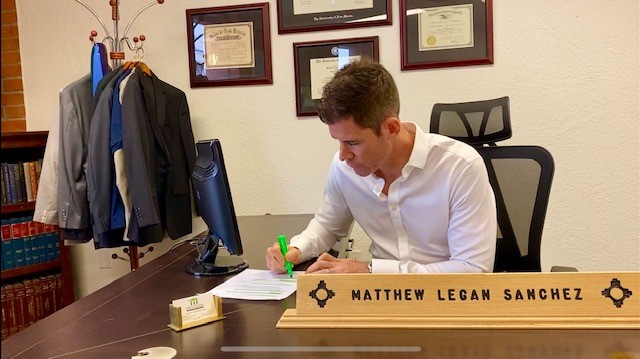
Common Problems with Guardian Cases in New Mexico
Guardian cases in Albuquerque, New Mexico are often referred to as Guardian Angel cases. In many ways, guardians act as a child’s guardian angel in situations where a parent is unwilling or unable to care for the child.
But guardian angel cases are not always heavenly. Here are the common legal issues that arise with guardian cases in New Mexico.
NEW MEXICO GUARDIANSHIP LAWS — TERMINATION OF GUARDIANSHIP
Virtually nothing is permanent in family law. Most “permanent” orders can be modified based on a major change in circumstances.
The Kinship Guardianship Act enables the guardian to step into the parent’s shoes. Guardian cases, however, do not terminate parental rights. Because of this fact, a parent can motion the court to revoke guardianship, based on a major change in circumstances that affects the child’s best interests.
Often this poses a problem to guardians that have formed an immense bond with the child and may believe:
- The parent poses a danger to the child;
- The child is thriving with the guardian;
- The parent has been absent from the child’s life for extended periods;
- The child has displayed an extreme reluctance towards returning to the parent; or
- The parent has underlying issues that prevents them from providing adequate care.
APPOINTMENT OF A GUARDIAN AD LITEM – WHO PAYS FOR THE GAL IN NEW MEXICO?
The New Mexico guardianship statute addresses the appointment of a GAL in guardianship cases. According to NMSA 40-10B-9, “The court shall appoint a guardian ad litem if a parent of the child is participating in the proceeding and objects to the appointment requested.”
New Mexico law addresses payment of the GAL and states, “The court may order all or some of the parties to a proceeding to pay a reasonable fee of a guardian ad litem.” See NMSA 40-10B-9(C).
In guardianship cases, the court can order the parents to provide the guardian with
child support. See 40-10B-8(D). In situations where the parents are not providing the caregiver with child support, the court may order the parent(s) to bear the GAL’s entire expense.
HOW TO GET GUARDIANSHIP OVER A CHILD IN ALBUQUERQUE, NEW MEXICO
Guardianship Cases When More Than One Person Seeks Guardianship of a Child
At times more than one party may petition (request) the court to be appointed as a child’s guardian. In these situations, the court will likely determine if both parties have legal standing to request guardianship. “Legal standing” basically means, “can both parties meet the legal requirements to be appointed as the child’s guardian”?
Assuming that both parents have standing and meet the legal requirements of NMSA 40-10B-8, the court will likely appoint a GAL to determine the child’s best interests.
Getting Guardianship over a Child in New Mexico — The GAL Process
The GAL will conduct an investigation to determine the child’s best interests regarding guardianship. The GAL process will likely involve the following:
- A home visit;
- Speaking with the parties;
- Speaking with collateral sources such as extended family, counselors, CYFD, counselors, etc.; and
- Considering the child’s concerns and desires regarding guardianship.
The GAL will use the information uncovered during the investigation to enter Recommendations regarding the appropriate guardian.
The GAL’s Recommendations will become an enforceable family court order, unless an objection is filed within ten days.
GUARDIANSHIP VOIDED WHEN PARENT NOT PROVIDED WITH NOTICE OF HEARING
A Father and Mother’s Constitutional Right to Receive Notice of Guardianship
The caregiver seeking guardianship must serve notice of the hearing on all concerned parties, including the child’s parents. The involved parties have a statutory right to file a response to the request for guardianship. See 40-10B-6(D).
In Burris-Awalt v. Knowles, the court granted guardianship without the guardian providing Father with adequate notice. Father filed a Rule 60(b) Motion to Set Aside, which was denied by the court. Father appealed. The Court of Appeals overturned the court’s decision, reasoning: “No notice was ever given to Mother of Father, and no hearing was scheduled or held on the matter.” See 241 P.3d 617 at ¶ 17.
The Court of Appeals recognized that failure to provide father with adequate notice, “ . . . stripped Father of his statutory and constitutional right to file a response and of his constitutional right to be heard on a matter involving his parental rights.” Id.
Long story short, problems can arise in guardianship cases when you fail to provide all concerned parties with proper notice under NMSA 40-10B-6.
WHY DOES GUARDIANSHIP HAVE HIGHER NOTICE AND CONSENT REQUIREMENTS THAN ADOPTION IN NEW MEXICO?
An interesting aspect about guardianship in New Mexico are the notice and consent requirements.
Notice is a legal concept that requires the party requesting a legal remedy (i.e. grandparent requesting guardianship over a child) to provide notice to the interested parties (i.e. the child’s parents).
The Kinship Guardianship Act requires notice to be provided to the following:
- CYFD if there is a pending matter;
- A child that has reached 14;
- The child’s parents;
- Anyone that has court ordered custody of the child; and
- Follow the FICWA when the child is an “Indian child.”
Although a caregiver steps into a parent’s shoes with guardianship, the parent’s rights are not terminated. On the other hand, a parent’s rights are permanently terminated with adoption. Despite this fact, guardianship in New Mexico has greater notice and consent requirements vs. adoption.
For instance, with adoption notice is not required to be served upon an “alleged father.” See NMSA 32A-5-27(B)(1). Additionally, consent to the adoption is not required from “an alleged father who has failed to register with the putative father registry within ten days of the child’s birth and is not otherwise the acknowledged father.” See NMSA 32A-5-19(E).
Unlike adoption in New Mexico, with guardianship an alleged father is entitled to notice. Additionally, with guardianship consent is required, even if the alleged father failed to register with the putative father registry within ten days of the child’s birth.
Why does New Mexico law place a higher notice and consent burden on guardianship, when adoption irrevocably terminates parental rights?
This is a question for your local legislature, who creates New Mexico law. As a lawyer, I merely follow and apply New Mexico law.
GUARDIANSHIP LIKELY GRANTED WHEN PARENTS FAIL TO FOLLOW THROUGH WITH GAL
A common situation arises with guardianship cases where a parent appears at the first hearing and objects to the proposed guardianship. Because the parent participates and objects, the court is forced to appoint a GAL to conduct an investigation and make recommendations regarding the child’s best interests.
The parent is ordered to pay a portion of the GAL fees. In some situations, the parent is ordered to bear the entire GAL expense, because they are not providing the caregiver with child support.
The parent then disappears and does not follow through with paying their portion of the GAL fees. Because of this fact, the GAL is unable to complete the necessary investigation.
Over the past decade I have repeatedly seen this issue occur. In all instances, the assigned judge has granted the proposed caregiver with guardianship over the child, based on the parent’s failure to follow court orders.
WHAT ARE THE ALTERNATIVES TO GUARDIANSHIP IN ALBUQUERQUE, NM
An alternative to guardianship in Albuquerque, NM is to complete a Caregiver’s Authorization Affidavit.
The caregiver may execute a Caregiver’s Authorization Affidavit, in situations where a child lives with a caregiver who is a grandparent, aunt, uncle or qualified relative (this can include an adult with whom the child has a significant bond – which is pretty broad).
The Caregiver’s Authorization Affidavit is valid for up to a year after the date on which it is executed. See 40-10B-15.
The Caregiver’s Authorization Affidavit does not make the caregiver a legal guardian that steps into a parent’s shoes and assumes parental rights. It does, however, enable the caregiver to enroll the child in school and to secure medical, dental, and mental health care for the child, on the same level as a guardian.
Access the Caregiver’s Authorization Affidavit by clicking here.
DOES GUARDIANSHIP IN NM OVERRIDE PARENTAL RIGHTS?
Yes. Once granted, the guardian steps into the parent’s shoes and assumes all parental rights, other than the right to consent to adoption. When granting guardianship, the court may order that the parent retain rights and duties, such as the right to communication/parental visitation, and the duty to support the child.
GUARDIANSHIP VS. PARENTAL RIGHTS IN NEW MEXICO
Under the Kinship Guardianship Act, the guardian assumes all parental rights while the guardianship is in place, other than adoption rights.
GUARDIANSHIP AND PARENTAL VISITATION IN ALBUQUERQUE, NEW MEXICO
In Albuquerque, New Mexico, the child’s guardian can make all decisions regarding parental visitation and communication, unless the court orders otherwise.
DO GUARDIANS HAVE GREATER RIGHTS THAN BIOLOGICAL PARENTS?
No. In New Mexico guardians have the same rights as biological parents, other than the right to consent to an adoption.
HOW TO GET GUARDIANSHIP OF A CHILD WITHOUT GOING TO COURT?
A caregiver can be appointed as a child’s guardian, without going to court, when the child’s parents are living and have consented in writing to the proposed guardianship.
CAN ONE PARENT GIVE GUARDIANSHIP?
In New Mexico, the consent of both parents is not required if each parent meets at least one of the requirements of 40-10B-8(B). For instance, a parent that is demonstrated to be unfit or absent does not have the ability to veto the consent to guardianship.
Both living parents are entitled to notice. Unlike adoption, with guardianship, an alleged father is entitled to notice and must consent to the guardianship. When one parent objects to the guardianship, the court will likely grant temporary guardianship for 180 days, and appoint a Guardian Ad Litem to complete an investigation and make recommendations regarding the child’s best interests.
HOW HARD IS IT TO TERMINATE GUARDIANSHIP IN NEW MEXICO?
Unlike adoption, the Kinship Guardianship Act does not permanently terminate and sever the parent and child relationship. In New Mexico, guardianship can be revoked when the court finds that the proposed revocation of guardianship is in the child’s best interests.
IS IT EASIER FOR GRANDPARENTS TO GET GUARDIANSHIP OVER A CHILD IN NM?
Under the Kinship Guardianship Act any caregiver with whom the child lives can request guardianship. Grandparents can request guardianship over a child in NM, but the grandparent must follow the same requirements any eligible caregiver.
(505) SANCHEZ IS AN ALBUQUERQUE GUARDIAN LAWYER THAT HELPS GRANDPARENTS UNDERSTAND COMMON ISSUES WITH GUARDIAN CASES ALBUQUERQUE, IN NEW MEXICO
Are you a grandparent or caregiver that still has questions about common issues with guardian cases in Albuquerque, New Mexico? Matthew Legan Sanchez is a New Mexico child guardianship attorney that has the experience you need to win your case. Sanchez can be reached by calling (505) SANCHEZ.

Albuquerque child guardianship attorney for guardian cases in New Mexico






